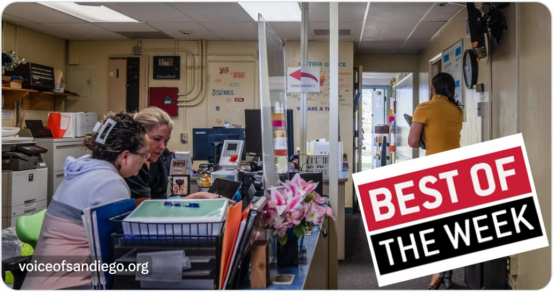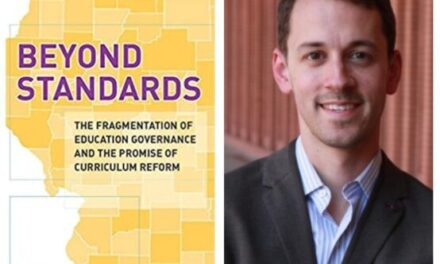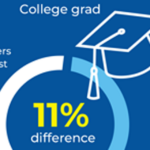In this week’s newsletter: Parental mistrust of schools is growing on the left as well as the right. A San Diego school’s successful efforts to reduce absenteeism show how it can be done. A veteran school librarian tells us that the book challenge process works — if district leaders let it. HBO and Issa Rae are mounting a TV version of “Nice White Parents.” And a national spotlight on stellar student journalism.
MISTRUSTFUL PARENTS
The big story of the week
The big education story of the week is the negative effects of inadequate literacy instruction on parental trust — and the lack of sufficient coverage needed to cover the literacy reform effort.
What’s being attempted in NYC and many other parts of the nation is one of the biggest education stories of the decade. “No major metropolitan school district has ever managed to raise reading achievement at scale — or to make higher test scores stick,” writes Robert Pondiscio in a sobering overview of NYC Reads in the outlet Commentary.
Researchers, school systems, and publishers responsible for the prolonged use of discredited methods and materials are — not surprisingly — trying to avoid accountability. Nineteen different Teachers College colleagues declined to comment or didn’t bother to respond, including the discredited former head of the program, according to the Columbia Spectator’s Sabrina Ticer-Wurr. To block Ohio’s efforts to improve literacy, Reading Recovery is suing Ohio, reports EdWeek’s Sarah Schwartz.
And yet parents and the general public still know precious little about how their kids and their schools’ efforts are going, week in and week out. “It’s no accident that Moms for Liberty has embraced the ‘science of reading’ movement,” writes NYC parent and journalist Kendra Hurley in Slate. “Reading instruction drove a wedge between me and my kids’ teachers.”
Until news outlets give the literacy reform implementation story the Taylor Swift-level of attention it warrants — showing progress and shining a light on pockets of resistance — mistrust seems likely to continue to spread among parents on the left and the right.
Other big education stories this week:
📰 ISRAEL-HAMAS CONFLICT: There’s been a surge of stories about protests on U.S. college campuses (AP, Washington Post, LA Times) and K-12 teachers grappling with how to talk to students about the conflict (LA Times, EdWeek, NPR, Chalkbeat NY). But there hasn’t been anything I’ve seen on how Israeli and Palestinian kids are faring in schools in the aftermath of the recent violence, like we saw with Elissa Nadworny’s NPR coverage in Ukraine. I hope to see some in the coming days.
📰 BOOK FAIR BAN: The news that Scholastic’s renowned book fair is allowing schools to opt out of showcasing 64 titles on race and gender predictably generated a lot of media coverage (New York Times, CBS News, NPR, Washington Post, Philadelphia Inquirer). There’s been a consistent stream of news on book bans — like this Des Moines Register piece this week on all the books banned so far under a new Iowa law. I wish we’d see the same attention focused on topics that impact more kids directly, like chronic absenteeism and literacy reform.

COMBATING CHRONIC ABSENTEEISM
The best education journalism of the week
The best education journalism of the week is Jakob McWhinney’s Horton Elementary Is Chipping Away at Chronic Absenteeism for Voice of San Diego, published earlier this month.
The story is valuable for its directness, presenting the problem of chronic absenteeism at a San Diego elementary school and describing how the school has engaged parents and supported kids. Two years in, the effort seems to be paying off.
Serving mostly vulnerable students, Horton’s chronic absenteeism rate had tripled to 67% in 2021-22, double the district’s overall rate. To address the problem, the school’s relatively new principal has held weekly meetings with her attendance team and developed a three-tier program ranging from school-wide engagement activities to highly targeted supports including home visits.
Featuring in-person reporting about a school that’s made progress against a difficult problem, this kind of story should be a regular thing for education reporters. Quotes from Horton students or parents would be a great addition, but this is still a strong example of what a single education reporter can do.
Other standout stories we saw this week:
🏆 I love local stories with national context like Marcela Rodrigues’ story about districts like Dallas that use lots of international teachers, especially when they’re accompanied by an excellent interactive graph showing districts’ relative numbers across several states (Dallas Morning News).
🏆 Reporting from a Denver high school, Stephanie Hughes considers the district’s reinstatement of campus police after a shooting in March, digging into the cost, the effectiveness, and student opinions (Marketplace).
🏆 Sydney Sims’ story about historically low Black voter turnout in Atlanta’s school board elections suggests that one culprit could be inadequate news coverage of local races (Capital B/Atlanta Civic Circle).
🏆 This brief but detailed piece from Ethan Bakuli plunges us into the world of Detroit’s Belle Isle Aquarium, where hearing-impaired students learn about their hometown’s ecology over a weeklong field trip (Chalkbeat Detroit).
🏆 Sergio Martínez-Beltrán fits both powerful and funny quotes into this radio feature about plumbers in Texas becoming substitutes so that teachers can step away from the classroom to protest the state’s voucher bill (NPR).
A LIBRARIAN’S GUIDE TO BOOK BANS
Our latest columns and commentary

Above: This week’s columnist Becky Calzada (right) is pictured with fellow librarian Carolyn Foote in People magazine earlier this year.
For all the hundreds of stories about book bans that have been produced, few of them feature a school librarian detailing the actual process that takes place when a book is challenged.
That’s why we commissioned Leander, Texas, veteran school library coordinator Becky Calzada to give reporters and everyone else a peek into the mysterious process.
Calzada reminds us that while challenges have skyrocketed and some districts are bypassing their own procedures, most schools have lots of experience handling book challenges — and that they’re not happening everywhere.
Twelve years into her current job, Calzada says she hasn’t seen any removal of books from her district’s school libraries.
Thanks to the Solutions Journalism Network for featuring Kate Rix’s piece for The Grade about writing solutions stories that aren’t fluff pieces.

Above: Coming in January from Beacon Press is journalist Laura Pappano’s book “School Moms: Parent Activism, Partisan Politics, and the Battle for Public Education.” Keep an eye out for an upcoming column for The Grade by Pappano on covering parent activists.
PEOPLE, JOBS
Who’s going where and doing what
🔥 Kudos & mentions: There’s a nice mention of Matt Drange’s Insider investigation on sexual predators at his alma mater in the Sunday Long Read newsletter: “a really impressive piece already on its way to having real-world consequences.” The Hechinger Report’s Jill Barshay was mentioned by the Fordham Institute’s Education Gadfly for her story on problems with drop-in tutoring. And lastly, economist and author of the 2008 book “The Race Between Education and Technology” Claudia Goldin won the Nobel Prize in economics last week for her work on the gender pay gap. Congrats!
🔥 Unsolicited advice:
“Volunteers are not representative of most students,” reminds Jill Barshay on covering education research. Her other big advice? “Big results can be statistically insignificant.”
“We need more stories about instructional processes and wins that parents and teachers and policymakers can learn from,” AL.com Ed Lab editor Ruth Serven Smith tells us. Reporters who’ve become experienced asking basic questions about the skills and tactics of literacy need to “apply the same questions to understanding the processes and practices of math literacy, numerical fluency, and problem-solving” from K through 12.
Make sure to go beyond the usual focus on space and resources and also include immigrant and refugee students’ reasons for leaving their home countries and their hopes for the future, Harvard education professor Sarah Dryden-Peterson tells us. “That’s the life-sustaining part.”
🔥 Fellowships: The application is now open for the Spencer Education Journalism Fellowship with a deadline of Feb. 1, 2024. We’re told that Sarah Carr is taking over running the program from LynNell Hancock. The Chips Quinn Scholars Program for Diversity in Journalism announced its newest fellows and mentors, with many current and former education reporters among them including former WBEZ education reporter Nereida Moreno, who wrote a lovely story this week following high schoolers thrift shopping before heading off to LAist. Congrats to all.
🔥 Voices:
“I remember being struck by how much these young students learned,” writes education journalist Sarah Carr about her return to the early education beat. “Because I could not interview the kids in quite the same way as older ones, I was forced to be a much closer observer of how that learning, and associated teaching, happened.”
The little-discussed downside of abundant local newspaper coverage is that it often “fostered a certain coziness with the area’s power players,” writes ProPublica’s Dan Golden, who’s covered education on and off for decades. The resources and relationships were there, but sometimes the scrutiny and skepticism weren’t.
Make sure to go beyond the usual focus on space and resources and also include immigrant and refugee students’ reasons for leaving their home countries and their hopes for the future, Harvard education professor Sarah Dryden-Peterson tells us. “That’s the life-sustaining part.”

Above: Nashville Public Radio’s Meribah Knight (left) hosts Serial’s new podcast “The Kids of Rutherford County.”
APPEARANCES, EVENTS, & NEW RESOURCES
What’s happening and new research
⏰ Podcasts: Serial’s newest podcast launches next week and is based on reporting by Nashville Public Radio’s Meribah Knight and ProPublica’s Ken Armstrong about a Tennessee County with a troubling pattern of arresting and even jailing kids. You may recall that Meribah sat down with The Grade a couple of years ago to talk about fearful educators, conflicting priorities, and vulnerable kids.
⏰ TV: Issa Rae’s production company is behind the upcoming adaptation of Serial’s “Nice White Parents,” which is slated to become a half-hour series on HBO.
⏰ Math Collaborative: You might have noticed a lot of stories lately about math instruction, including this week’s Post and Courier story on detracking efforts. That’s in part thanks to the Education Reporting Collaborative, which is supporting the eight-newsroom project “The Math Problem.” The Collaborative hosted a webinar and panel discussion this week about their math series. The effort is coordinated by Sarah Carr and supported by the newsrooms, several of which receive foundation support.
⏰ New ventures: Nieman Lab profiled some new hyperlocal outlets in Massachusetts that should give the education beat some love, noting that Newton Beacon editor Bryan McGonigle “has noticed that … coverage of public schools have especially interested and resonated with the community.”
⏰ Events: The Washington Post’s Laura Meckler is moderating a live panel discussion Oct. 24 in Washington, D.C., on race, class, and excellence gaps. WBUR will host a K-12 education community listening session on Oct. 23. If you’re in Newark, you can learn more about segregation in New Jersey’s schools at a live event Oct. 26 featuring NJ Spotlight News data reporter Colleen O’Dea, Chalkbeat Newark’s Jessie Gomez, and WNYC Morning Edition host Michael Hill. In case you missed it, Grade contributor and author Leslie Fenwick spoke at the AERA Brown Lecture about the failure to integrate Black principals and teachers into desegregating schools.
⏰ Research: Test scores in California were released this week, showing that students remain far below pre-pandemic levels of achievement (EdSource, CalMatters, LAist, LA Times). The progress report isn’t even across the country, however. While students in Prince George’s County in Maryland have shown small gains on test scores, too (Washington Post), South Carolina schools are showing strong improvement (Post and Courier). Meanwhile, a Brown University analysis of test scores shows that the push to promote the science of reading has helped some states exceed pre-pandemic reading scores, but many states still lag behind (The 74). Researchers from the National Student Support Accelerator studied the virtual tutoring program OnYourMark and found that it helped young children learning to read make significant progress, but it was still less effective than in-person tutoring (The 74).
THE KICKER

“They are unafraid. They are digging deep. They are really living up to the values and principles of being journalists while also being full-time students.” – National AP reporter David Bauder on student journalists
That’s all, folks. Thanks for reading!
Reply to this email to send us questions, comments or tips. Know someone else who should be reading Best of the Week? Send them this link to sign up.
Using Feedly or FlipBoard or any other kind of news reader? You can subscribe to The Grade’s “feed” by plugging in this web address: http://www.kappanonline.org/category/the-grade/feed/.
Read more about The Grade here. You can read all the back issues of The Grade’s newsletter, Best of the Week, here.
By Alexander Russo with additional writing from Colleen Connolly, Will Callan, and Greg Toppo.
ABOUT THE AUTHOR

The Grade
Launched in 2015, The Grade is a journalist-run effort to encourage high-quality coverage of K-12 education issues.













